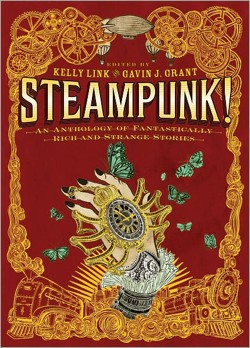Halfway through reading Candlewick Press’s Steampunk! anthology, edited by Kelly Link and Gavin Grant, I was pining for a course to teach on steampunk. While some might be dismissive of an anthology marketed toward young adults published by a press best known for children’s books (The lion’s share of my son’s primary readers are Candlewick books), they’d be remiss to do so. The talent collected by editors Kelly Link and Gavin Grant is considerable, and not a one has written a throwaway tale with a few cogs and gears slapped on. Instead, each story challenges the boundaries of the steampunk aesthetic, while standing on its own as thoughtful, insightful works of short fiction.
The usual suspects for the constitution of a steampunk work are present in the early stories, but the further in one reads, the farther from London we journey, and only on rare occasion and in dire need, by airship. The technology is still here, but it often takes a back seat to the characters, or as a delivery device for thematic content. Instead of an explanation of how the gizmo works, we’re getting reflections on how the world works.
Cassandra Clare starts off the collection with “Some Fortunate Future Day,” a solemnly tragic reflection on the adage, if you love someone, set them free. Both Clare and Libba Bray employ time travel to tell their tale, with the latter’s “The Last Ride of the Glory Girls” pondering the nature of free will via a group of female outlaws who employ a Pinkerton spy with a penchant for tinkering with clockwork devices. It’s my favorite of the bunch, told with the precision and concision short fiction requires. Cory Doctorow’s “Clockwork Fagin” comes in for a close second behind Bray with a steampunk play on the Dickensian orphan, delightful despite a dearth of dirigibles or derring do. Instead of adventure, we find a tale of a decidedly domestic bent that plays on a reader’s repeat viewings of Oliver or Annie, fulfilling the wish that the orphan would rise up against Fagin, and establish themselves as their own Daddy Warbucks.
Shawn Cheng’s short cartoon “Seven Days Beset By Demons” is as clever a meditation on the seven deadly sins as I’ve ever read, while Ysabeau S. Wilce’s “Hand in Glove” blends whimsical mad science with neo-Victorian CSI. Delia Sherman’s “The Ghost of Cwmlech Manor” will have readers wondering where the steampunk is, until it places its ghosts literally in the machine.
Elizabeth Knox’s “Gethsemane” includes the first notable airship, a complicated and morally messy tale about keeping watch over the ones we love, about sight and blindness, and staring in to the heart of the sun. Kelly Link’s “The Summer People” carries the lightest sprinkling of the steampunk aesthetic, while retaining all of Link’s magical brand of weird.
Garth Nix’s “Peace in Our Time” is the closest I came to disappointment, but that’s due more to repeat readings of Poe’s “Telltale Heart” than any failing of Nix’s. Christopher Rowe’s “Nowhere Fast” joins the ranks standing on the blurry line between steampunk and greenpunk with this post-apocalyptic steampunk cycling story about going somewhere beyond the boundaries. Kathleen Jennings’ “Finishing School” is a clever girl’s own adventure set in Australia, and illustrated in a fashion that recalls early modes of cartoon art. Dylan Horrock’s “Steam Girl” is the first story I’ve read that dares to write about the cosplay steampunk in the real world, telling a tale of the difficulties of being a teen and falling in love. Holly Black keeps the romance rolling in “Everything Amiable and Obliging,” stealing a little Asimov to motivate her automaton amour, with M.T. Anderson walking clear off the steampunk map into ancient Rome with the excellent “Oracle Engine.”
Fourteen stories, and not a dud among them. Educators looking for a textbook to inspire class discussion around the question, “What is steampunk?” should look no further than this oft-iconoclastic collection. For those not so pedagogically inclined, it’s got my vote for the best collection of steampunk I’ve seen so far, not only as steampunk tales, but as damn fine short stories in their own right.
Mike Perschon is a hypercreative scholar, musician, writer, and artist, a doctoral student at the University of Alberta, and on the English faculty at Grant MacEwan University.










